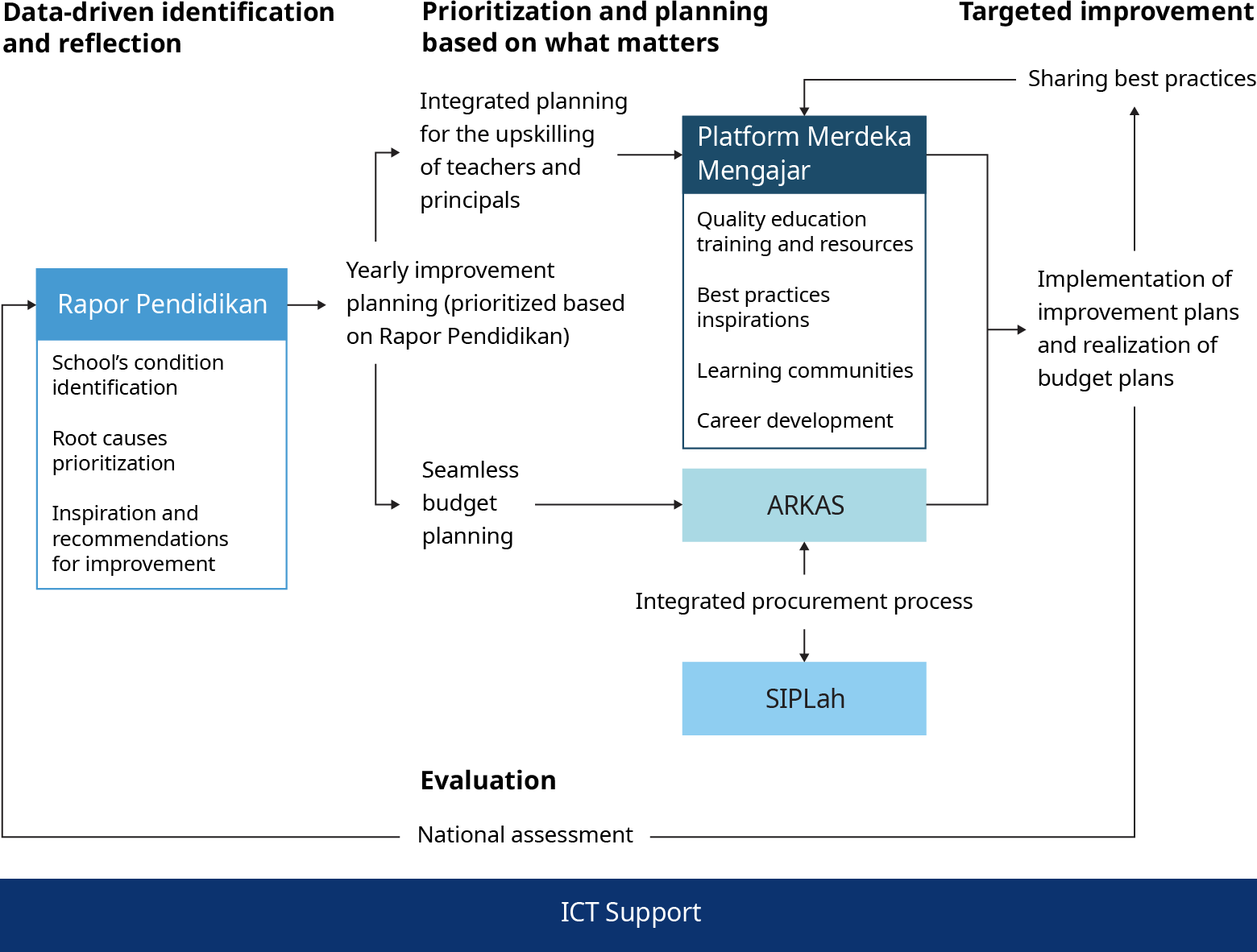The acceleration of a nation's development and the revitalization of talent often begins with educational rejuvenation. Many countries understand this principle, and over the past few decades, numerous inspiring educational reforms have been initiated worldwide. In Indonesia, the quality of basic education has raised concerns in recent years. On one hand, educational reforms seem to have entered a bottleneck period, requiring a re-evaluation of the current situation and root causes for targeted interventions. On the other, injecting vitality into such a vast education system swiftly demands innovative new approaches.
This joint report with the Indonesian Ministry of Education, Culture, Research, and Technology (MoECRT) focuses on the intermediate outcomes of Indonesia’s recent K-12 (kindergarten to Grade 12) educational reform program, ‘Merdeka Belajar’ (Emancipated Learning), and the government’s efficient and creative incorporation of technology in the execution of education policies. It examines the root causes that have plagued Indonesia’s basic education system, showcases the intentions and scope of the educational rejuvenation program, and reveals how technological tools and interventions played a pivotal role in the implementation of policies.
Educational landscape in Indonesia
Indonesia has approximately 53 million K-12 students and 3.4 million teachers in 2023, but its basic education system grappled with low academic performance and regional disparity for a long time. The root causes include the prescription-based curriculum, lack of career advancement and training access for teachers, and low efficiency in school management and decision making. The educational reform program hence encompasses crucial elements to tackle these challenges at their roots.
The new curriculum, Kurikulum Merdeka, aims at making learning simpler and more profound, and enhancing students' critical thinking and problem-solving skills. Effective communication, training, and encouragement for teachers to engage in the re-creation of the curriculum are paramount. Throughout the process, technology tools played a crucial role, while leaving a profound and lasting impact, as a direct communication channel has been established between the MoECRT and individual teachers.
Technology-enabled reform
Indonesia's large and complex education system makes reforming it a challenging task. Educational tools, facilitated by the widespread use of smartphones, can achieve revolutionary behavioral changes. The Indonesian government has recognized this and has developed corresponding technological solutions to facilitate Merdeka Belajar, such as Platform Merdeka Mengajar (PMM), Rapor Pendidikan, ARKAS, and SIPLah.

Our survey of 118,000 teachers and principals in Indonesia has reported positive intermediate impacts on key education actor’s behaviors, mindsets, and culture shift. They have access to more education resources, and became more pro-active and collaborative in learning, upskilling, and sharing. School principals also reported quality and efficiency improvement in decision making, budgeting, and planning.
The MoECRT is continuously adding usage scenarios to make them a normalized tool in teachers' professional lives. Each of these tools interact with other technology platforms in the ecosystem, becoming a fundamental tool for modern school management.
Future state of Indonesia’s education sector
Globally, there is an irreversible trend towards making education smarter, more accessible, and focused on individual development, utilizing a myriad of ever-evolving technological means. For emerging nations, it is an opportune window to catch up.
Indonesia's endeavors today align with this overarching trend by choosing a distinctive path. Instead of taking on a full education digitization which is costly and takes long time to roll out, Indonesia is focusing on developing tools to unlock human potential and deploying them swiftly to where urgent interventions are most needed.
The transformative journey is a nuanced process of shifting culture and mindset, not only within the central government, but also among the vanguard of Indonesia's education system, including teachers, school principals, and local government entities. As the country embarks on this journey, the importance of sustained efforts, consistency, and perseverance cannot be overstated in achieving educational transformation. It is crucial to acknowledge that moving in the right direction entails more than immediate change; it requires patience and perseverance.
